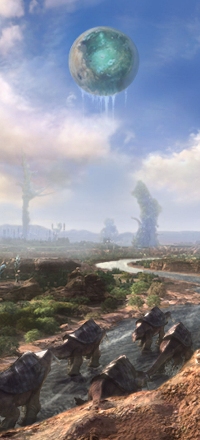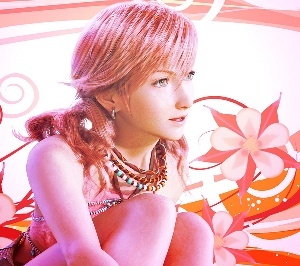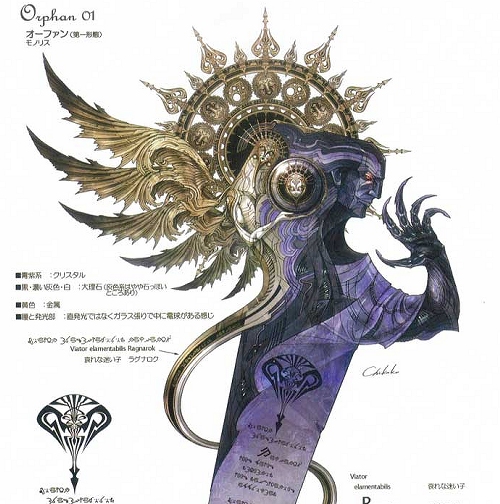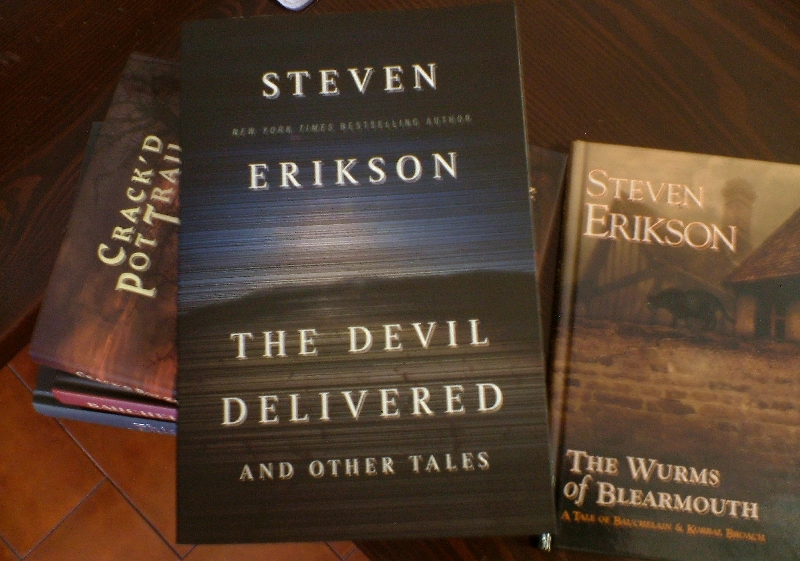 And a bit of Malazan and Prince of Nothing too (men are ever deceived).
And a bit of Malazan and Prince of Nothing too (men are ever deceived).
Anyone noticed a number of plot points shared? I’ll go through some spoilers assuming you’ve seen both Fringe and Final Fantasy 13 (and a bit of 13-2). Some of these things I have commented already.
Despite the 13 being the worst Final Fantasy gameplay-wise, it has a wonderful setting, with a great story and the best mythology in the series. Some themes even in common with Malazan, like the relationship between gods and human beings, and the number of times a revelation completely overturns what you believed up to that point.
The setting is essentially split between two worlds, Pulse is the huge earth-like world that is wild, filled with weird creatures and other colossal monsters roaming around. And Cocoon, that is a smaller planet hovering in the sky within Pulse’s atmosphere. Human beings live here nourished and protected by their gods, who also keep Cocoon afloat.
Cyclically Pulse sends up an attack to Cocoon, and Cocoon’s gods “mark” some human beings of choice to defend them from the attack. If they fail they get turned into mindless, misshapen monsters, if they succeed, they get turned into crystals for eternity (such a great reward for being your god’s bitch). FF13 begins during one of these attacks, with a chunk of the population of Cocoon being “deported”, since they suspect someone may be “contaminated” (by Pulse gods, marking some other human beings on Cocoon).
In the beginning of the game the party is split between characters marked by Cocoon gods, and two (Vanille, Fang) by Pulse gods. Only they get together because of a chain of events and some complicate misdirection and manipulation going on. With a wicked touch of genius: the trope of the naive, airhead girl is subverted by this girl doing most of the manipulation, “steering” around the other characters by relying on the fact that no one takes her seriously (including the player, who’s caught in this subversion). By playing the naive, totally clueless girl that she appears, she candidly drives the party.
 Much later in the game not only it is revealed that the girl herself knew very little and was also being manipulated and used as a pawn in a larger plan, but that the party had been constantly followed by an “invisible hand” that nudged them onward, kept them on their course and even helped them at crucial moments, literally saving their life. All the while, though, the characters were ALWAYS convinced of following their own will, their morals, fighting for freedom and other noble ideals with lots and lots of self proclaimed rhetoric that was used to establish the characters as REAL HEROES. That amusingly never knew what they were doing for all the 60 hours the game lasted, wrongly “appropriating” the responsibility and merit of their actions, up to the final scenes, until the control is almost symbolically wrestled out from the player and the last CG sequence starts.
Much later in the game not only it is revealed that the girl herself knew very little and was also being manipulated and used as a pawn in a larger plan, but that the party had been constantly followed by an “invisible hand” that nudged them onward, kept them on their course and even helped them at crucial moments, literally saving their life. All the while, though, the characters were ALWAYS convinced of following their own will, their morals, fighting for freedom and other noble ideals with lots and lots of self proclaimed rhetoric that was used to establish the characters as REAL HEROES. That amusingly never knew what they were doing for all the 60 hours the game lasted, wrongly “appropriating” the responsibility and merit of their actions, up to the final scenes, until the control is almost symbolically wrestled out from the player and the last CG sequence starts.
In truth, it was a god called Barthandelus who drove the plot like a supreme Deus ex Machina, making the characters believe they were responsible of their own actions when they were just being manipulated and ended up acting in predictable ways (doing every time exactly what Barthandelus wanted, while believing instead they were going AGAINST him, the goons).
The first revelation was: the gods weren’t keeping human beings in Eden-like Cocoon because they were benevolent, but because Cocoon was something like a FARM. They were only getting human beings prepared and fattened, so that they could then mercilessly MASS SLAUGHTER them at once. Such lovingly gods. Their goal was about opening a sort of portal, that the mass sacrifice would have triggered, and so forcefully pull back in the physical world the primal god that was responsible for creating the world and the gods themselves (the MAKER), but that ended up abandoning them all to their own sad destiny (one of the gods is appropriately named “Orphan”).
The second revelation was: Barthandelus was manipulating everything, and subverting even the plan itself. It was not anymore about opening a portal to pull the MAKER this side, but about the world being destroyed so that Barthandelus could himself abandon it and travel over, through the portal, to the side where the MAKER is. First FRINGE analogy: this reminds me when William Bell actually decides to destroy two worlds so that he himself could cross over and make his own. Same as Barthandelus, destroying two worlds so that he could gain access to something new (after having manipulated all characters for a whole season/game behind the scenes to align perfectly to his will).
At the end of the game Barthandelus is (predictably) defeated, but the characters continue being stuck to his plan. In fact they end up fighting Orphan, the god that sustains Cocoon. When Orphan is defeated, the game ends with a CG sequence. Cocoon starts to plunge toward the earth/Pulse. It’s the end of the world as Barthandelus planned it (even if he’s not there to rejoice). But in the end Fang and Vanille sacrifice themselves, transform into a pillar of crystal and prevent Cocoon to crash on Pulse. Eventually the survivors move down on Pulse and settle there, everyone living happily ever after.

Something like the end of Fringe season 3. The two worlds originally separated and fighting each other finally linked by a bridge/crystal pillar. Only that Lightning/Peter gets ERASED from the timeline by all seeing being(s) called Etro/Observers. But it’s not over, because while everyone else has forgotten about Lightning/Peter, her sister still does remember her thanks to the power of love™.
So begins Final Fantasy XIII-2. Due to the big fuckup of Etro/Walter trying to save Lightning/Peter and messing the timeline, all the timelines/worlds now are in collision and merging. There are anomalies all over, and the game will be about fixing this stuff. Being helped by Lightning that in this case is out of the timeline and can see past and future, sending her agents around.
Deja-vu.
P.S.
The ending of Final Fantasy 13 is a wonderful ANTI-Final Fantasy going right against all forms of conventional storytelling, only doing it so subtly that no one ever notices. The game does to you, the player, what Barthandelus did to the characters through the whole game. The ending, lavished with typical Final Fantasy rhetoric, makes the player believe that the characters of the game succeeded and survived because of their own strength as human beings, their uncompromising values, heroic efforts and so on. But the truth is that a god was watching this whole thing and found it so melodramatic and pathetic that she took pity of them (actually it’s shame, since this god was originally responsible for creating humanity) and decided to save them (another literal Deus ex Machina). The most amusing part is that she was so pitiful that she kept herself completely hidden and let the characters believe that they saved the day on their own without receiving any help.
Must keep them happy, and ever deceived.
P.P.S.
You can actually push this to another level. The game mirrors its own message. Final Fantasy 13 is the game in the series where the player has the least control. It’s completely (and horribly) linear and on rails. You go through the whole of it as if going down a narrow corridor. See the irony? As if: the player has no control, mimicked by the characters having no control of their own actions within the frame of the story.
The post-modern game of framing can go on: in Scott Bakker’s work the message is precisely that you don’t have the control you think you have and that you’re only hopelessly and deeply deluded. Your life is strictly not different than watching a cutscene in a game, you’ve literally as much control even if you keep taking credit of your actions and showering yourself with praise. Now I don’t know if Motomu Toriyama wanted the game to send this message, but it certainly allows to be read that way. Or more likely: Toriyama mirrored as much real life as to have unwillingly carried some of its bleak truths.



 And a bit of Malazan and Prince of Nothing too (men are ever deceived).
And a bit of Malazan and Prince of Nothing too (men are ever deceived). Much later in the game not only it is revealed that the girl herself knew very little and was also being manipulated and used as a pawn in a larger plan, but that the party had been constantly followed by an “invisible hand” that nudged them onward, kept them on their course and even helped them at crucial moments, literally saving their life. All the while, though, the characters were ALWAYS convinced of following their own will, their morals, fighting for freedom and other noble ideals with lots and lots of self proclaimed rhetoric that was used to establish the characters as REAL HEROES. That amusingly never knew what they were doing for all the 60 hours the game lasted, wrongly “appropriating” the responsibility and merit of their actions, up to the final scenes, until the control is almost symbolically wrestled out from the player and the last CG sequence starts.
Much later in the game not only it is revealed that the girl herself knew very little and was also being manipulated and used as a pawn in a larger plan, but that the party had been constantly followed by an “invisible hand” that nudged them onward, kept them on their course and even helped them at crucial moments, literally saving their life. All the while, though, the characters were ALWAYS convinced of following their own will, their morals, fighting for freedom and other noble ideals with lots and lots of self proclaimed rhetoric that was used to establish the characters as REAL HEROES. That amusingly never knew what they were doing for all the 60 hours the game lasted, wrongly “appropriating” the responsibility and merit of their actions, up to the final scenes, until the control is almost symbolically wrestled out from the player and the last CG sequence starts.
